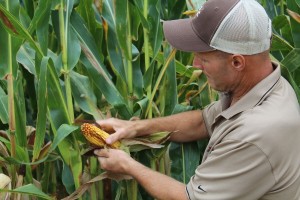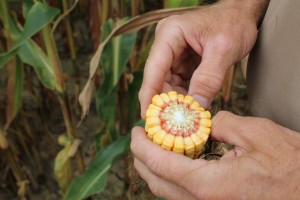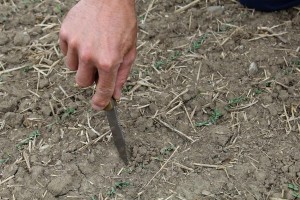TIFFIN, Ohio — A class project in 1989 turned into a career for Chuck Gates.
Gates, of Tiffin, has spent the past 25 years helping farmers decide what to plant — and how and where to plant — and he now advises more than 440 farmers.
Earlier this year, he was named Ohio’s Certified Crop Adviser of the Year.
But it all goes back to a presentation he did at Ohio State University, during one of his final ag economics classes.
At the time, he was completing an ag sales project, and gave a presentation to the regional manager for the DeKalb Co. The manager at the time, Earl Johnson, liked what he saw, and offered Gates his first job.
Most recently, or the past 10 years, Gates has worked for Seed Consultants, helping growers across northcentral Ohio, and beyond.
Changes in farming
Agriculture has changed significantly during Gates’ career, and one could argue there’s more need for expert crop advice today, than at any time before.

The planting equipment is more advanced, there’s more science about yield and performance, input costs are higher, profit margins are tighter, and environmental concerns about nutrients aren’t going away.
Scouting fields
As for the tight margins, Gates said farmers need to think critically about how they treat each field, and only apply treatments that make sense.
“The biggest thing is scouting your fields and knowing what’s out there and knowing whether you need to apply something,” he said.
When prices were better, farmers were more eager to try new things — some that earned them more money, and some that may have cost them.
“Just a few short years ago, we had $7 corn and $14 beans. It’s half of that now,” Gates said. “They (farmers) can’t afford to just go out and blanket spray everything.”
Like other crop advisers, Gates supports good field scouting, no matter what the market is like. This helps save the farmer money — even in profitable years — and is also environmentally responsible.

“Whether it’s nutrient management or the pesticides, I believe wholeheartedly in best management practices and integrated pest management,” he said.
Staying sharp
As a Certified Crop Adviser, he is required to complete 40 hours of continuing education every two years, and in recent years, nutrient management and water quality have been a big part of the training.
Gates helps farmers develop buffer strips (grass strips between fields and ditches), establish cover crops, and apply the right nutrients, at the right rate, place and time.
While farmers need to be responsible about what they put on their fields, Gates said it only makes sense that they would be.
“Farmers have taken a bad rap the past few years, with all the phosphorus and issues with Lake Erie … but what most nonfarm people don’t understand is that farmers aren’t just out there spreading fertilizer … they can’t afford to,” he said.
As an employee of Seed Consultants, he offers his advice as one of the benefits of buying his seeds. That could be an onfarm visit, over the phone, in a cafe — or pretty much anywhere a farmer is willing to meet.
And his advice covers everything from seed selection, planting, weed control and fertility.
Gates was nominated for the award by first-generation grain farmer Eric Niemeyer, of MadMax Farms, in Marion and Delaware counties.
“I’m a first-generation farmer, so I rely a lot on his knowledge,” Niemeyer said. “Several times a year, he’s out at my farm, scouting fields, etc. He’s pointing out the good, bad and the ugly, and it’s really helped me improve my productivity.”
Niemeyer farms about 600 acres of corn, soybeans, wheat and pumpkins.
New ideas
Niemeyer said working with a crop adviser doesn’t mean you have to do everything they say — but you do need to be open to their suggestions.
“As long as you’re open-minded, it’s absolutely a good investment,” Niemeyer said. “Being a first-generation farmer, I’m hungry for knowledge, I’m hungry to learn.”

He said people sometimes think his job is seasonal, but, although it gets busier during certain seasons, it’s actually a year-round job. It begins in midsummer, when Seed Consultants starts a new year of sales.
Farmers review and buy seeds early, and keep their order until planting time. And when he’s not selling seeds, Gates is out giving demonstrations, putting up road signs, or giving farmers advice.
Learn more about the CCA nomination here.
His customers range from the smaller, 30- to 40-acre farms, to some that are more than 4,000 acres. His customers range from English to Amish and Mennonite.
Bernell Zimmerman, a Richland County dairy farmer, said he relies on Gates because he’s “very knowledgeable,” and gives good answers to crop production questions.
Like partners
Although Gates doesn’t farm himself, Gates said he tries to treat his customers’ farms like they’re his own. If he can help them be more productive and profitable — then everyone wins.
“Basically, all of my customers farm for my farm — the way I feel about it,” he said. “I feel that every one of my customers is a friend. I’ve always believed in treating people the way you want to be treated.”
Get the details:
• The Ohio Certified Crop Adviser of the Year award was designed to recognize individuals who are motivated, and deliver exceptional customer service for farmer clients in nutrient management, soil and water management, integrated pest management and crop production.
• To learn more about this award or to nominate someone, visit http://agcrops.osu.edu/links/ohio-cca-of-the-year, or the Ohio AgriBusiness Association website, at www.oaba.net.
• Nominations are now open for the 2016 award, which will be announced at the Conservation Tillage Conference in Ada, Ohio, March 2. The winner received a plaque, and a $1,500 award.











